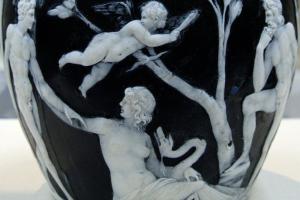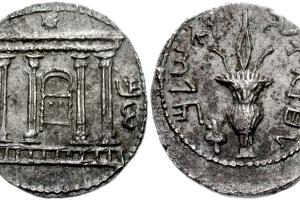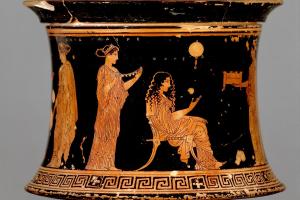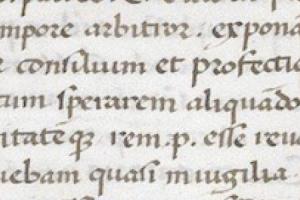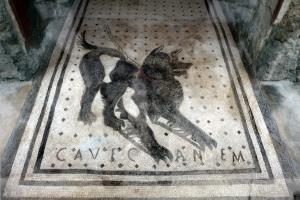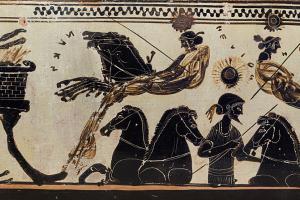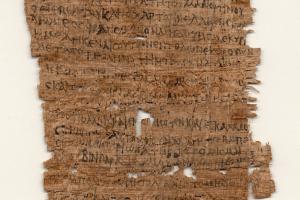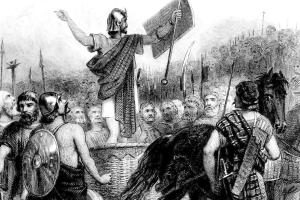Fall 2025
This course offers an introduction to essential moments in the history and literature of ancient Greece, from its rise to the end of the Classical period (that is, roughly, from Homer to Plato).
Who were the ancient Greeks, and what did they leave behind? From famous temples and statues to the houses, graves, and possessions of everyday people, we’ll explore the archaeology of the Greek world from the first farmers through the aftermath of Alexander the Great’s empire.
Themes from the literature & culture of ancient Greece, the Hebrew Bible, ancient Rome, and early Christianity significant for Western Civilization's development. 5 units. Fulfills R&C A or B + one L&S Breadth
What did ancient Greeks and Romans think defined the differences between free and enslaved people? How did they understand the institution of slavery to operate? In this class we'll explore these and related questions by reading literary and (some) philosophical texts.
This course is an investigation of two histories: the history of the Jewish people in Greek and Roman antiquity and the history of ancient imperialism. We will seek to understand how each of these histories can illuminate the other. From the sixth century BCE through to the fifth century CE, Jewish populations lived in the shadow of ancient empires (Persian, Hellenistic Greek, Roman). We will look at how this experience shaped Jewish identity, religion and cultural life. At the same time, the rich record for ancient Jewish history can help us understand how subject peoples experienced and shaped imperial rule. The course will involve readings from Jewish and non-Jewish ancient texts in translation (including from the Hebrew Bible, Dead Sea Scrolls, other apocryphal texts, Josephus, Tacitus, Roman imperial laws) and introductions to the archaeological and documentary evidence for ancient Jewish communities.
The first semester of study of Ancient Greek
The first semester of study of Ancient Greek
This is the third semester of the Ancient Greek reading sequence at Berkeley and teaches you to read Attic prose. We will focus on two texts, Lysias’ On the Murder of Eratosthenes and Plato’s Crito, improving our Greek reading skills and learning about the literature, history, and society of Classical Athens.
This course offers an introduction to ancient Greek drama and is intended for students who have taken both Greek 100 and Greek 101. We will read Euripides’ "Helen" in the original Greek, paying close attention to the language and to the literary, mythological, and political issues raised by this play. We will also discuss Euripides’ play in the context of broader cultural discourses about female identity, gender norms, and the ethics of war.
The first half of a two-semester language sequence preparing students to read Classical Latin.
The first half of a two-semester language sequence preparing students to read Classical Latin.
Selections in Latin from Caesar & Cicero. You will improve your mastery of Latin & learn to read prose with understanding & enjoyment by reviewing morphology, syntax, & vocabulary.
Reading of Petronius' *Satyricon* in Latin.
This course will serve as a rapid introduction to the main texts and problematics of archaic Greek poetry (Homer, Hesiod, Homeric Hymns, iambic, elegy, melic), as well as a briefer foray into classical Greek tragedy and history (with readings in the original ancient Greek).
This semester’s version of the seminar is an introduction to Greek papyrology.
A graduate seminar on the early work of Roman historian Tacitus. Good facility with Latin required.
The AHMA seminar, co-taught by Maher and Shelton, explores domestic spaces and the daily lives of people in the past through the study of household remains. This includes examining architecture, deposits and artifacts—the items of everyday life—associated with the construction and life of ‘homes’. The diachronic study of households helps reveal the intimate, everyday aspects of ancient life, highlighting how individuals and families interacted with their environment, how they used space, and how their domestic practices were tied to broader cultural and economic developments.
This course on pedagogy focuses on the teaching of ancient Greek and Roman Studies/Classics and of the ancient pre-modern world more broadly to prepare students to teach ancient languages as well as courses in which texts are taught in translation. Via a blend of practical help and investigation of issues of concern in teaching today, this course, required of all new graduate student instructors, strives to provide a supportive framework for teaching in a university setting.


